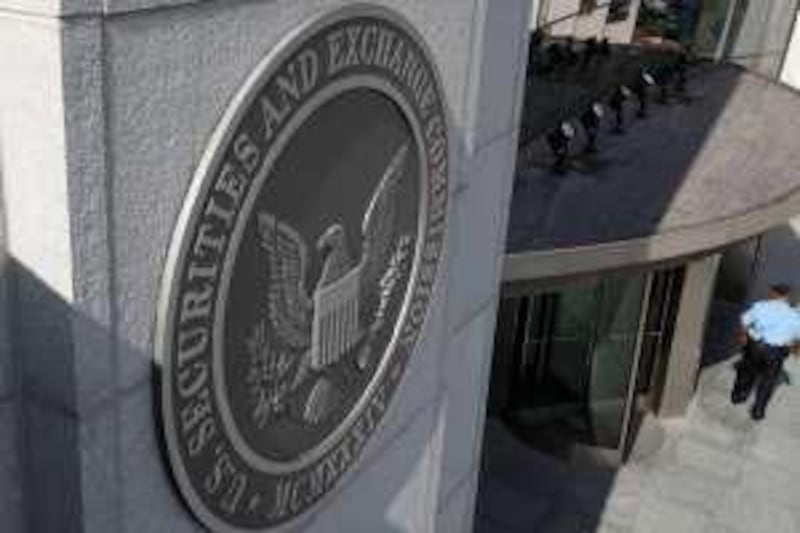An Emirati man has been sued and had his assets frozen by the US Securities and Exchange Commission (SEC) over alleged insider trading before a major energy deal in February. The SEC suit, filed in the US district court in New York late on Monday, alleged that Khaled Mohammed Sharif al Sayed al Hashemi bought 120,000 shares in Nova Chemicals in the weeks before the company was acquired by the International Petroleum Investment Company (IPIC).
Mr al Hashemi, a UAE national who lives in Abu Dhabi, is alleged to have made US$458,760 (Dh1.6 million) in illegal profits stemming from the deal with IPIC, a firm based in Abu Dhabi that invests in foreign petrochemical assets. The SEC complaint alleges he made the gains by buying shares in Nova, a Pittsburgh, Pennsylvania-based maker of plastics and other petrochemical products, in the two weeks before the $2.3 billion IPIC acquisition was announced on Feb 23.
When news of the acquisition came out, shares in Nova rose by 289 per cent to $5.21 in a single day of trading in New York, where the company was listed. That left Mr al Hashemi with a fair profit when he sold his whole stake just after the merger news, the SEC alleges. Making trades based on merger and acquisition deals that have yet to be announced is illegal in the US. It can carry stiff fines and even prison terms, as was the case in 2004 when Martha Stewart, a popular American TV personality, was sentenced to five months in jail for selling shares of the drug maker ImClone based on inside information.
Insider trading is also illegal in most jurisdictions in the Middle East, including the UAE. While the SEC's complaint did not reveal many details about the SEC's investigation of Mr al Hashemi, it said he bought 120,000 Nova shares using his online brokerage account. "These purchases began to accelerate as the merger date approached, as he made 54 per cent of his total purchases on the last trading day before the announcement," the SEC release said.
"Hashemi funded these purchases by liquidating nearly 80 per cent of the value of his stock portfolio and by wiring approximately $100,000 into his trading account." Mr al Hashemi then placed "limit orders", or directions to automatically sell shares when they rose above a predetermined price, according to the SEC complaint. When the Nova stock skyrocketed, the orders went into effect and his entire stake was sold.
After its filing, the SEC was granted a restraining order freezing Mr al Hashemi's assets. Attempts to reach him yesterday were unsuccessful. Mr al Hashemi's case is the second example in a week of the SEC taking action against Gulf individuals. Late last week, the SEC launched an investigation into Hazem Khalid al Braikan, a Kuwaiti businessman who was accused of planting fake news stories about acquisitions of two US companies by Gulf investors.
Mr al Braikan was found dead last weekend in an apparent suicide. Both cases have highlighted a lack of regulatory oversight of markets in the Gulf. While the SEC takes a tough stance towards share manipulation and insider trading, a history of lax regulation has engendered a culture in which many experts say it is possible to get away with the kinds of infractions that Mr al Braikan and Mr al Hashemi have been accused of.
Despite legal structures covering insider trading, most regulators in the Gulf do not actively pursue such cases, according to Robert McKinnon, the head of research at Al Mal Capital in Dubai. While the SEC employs complex algorithms to track the trading of the family and friends of people involved in mergers and acquisitions to root out any illegal activity, regulators in the Gulf typically rely on tipoffs before starting investigations.
"I don't think it's culturally accepted in any market, but wherever people have an opportunity, whether it is because of weak regulations or lax discipline in terms of Chinese walls and lax enforcement, you can have problems like these," Mr McKinnon said. But even under the SEC's tough regulatory standards, the allegations against Mr al Hashemi may be difficult to prove. To successfully prosecute its case, the commission must document that Mr al Hashemi's purchase was not just a lucky strike, or a very smart move.
@Email:afitch@thenational.ae






